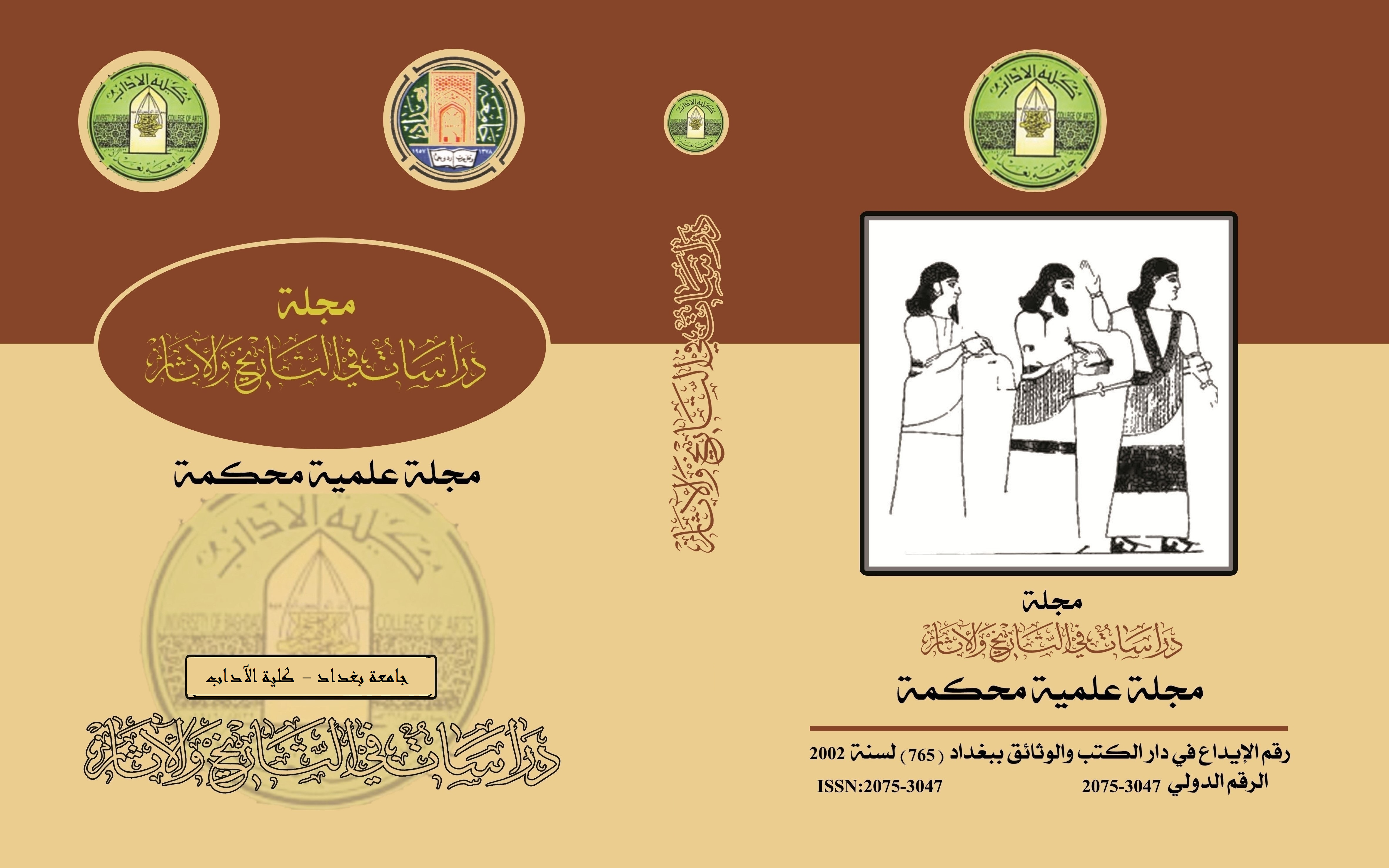أنواع التحقيب التاريخي ودلالاته عند المؤرخين العرب المسلمين (132ه-656ه/749م-1258م)
الكلمات المفتاحية:
التحقيب التاريخي، دلالاته، المؤرخين، العرب المسلمينالملخص
الحمد لله رب العالمين، والصلاة والسلام على سيدنا محمد (r)، وعلى آله ومن تبعه وسار على نهجه الى يوم الدين.
توالت على البشرية حقبٌ وأزمان كثيرة، تخللتها أحداث تاريخية مختلفة ومتنوعة؛ ولتسهيل دراستها على المؤرخين والباحثين، وعلى القراء والمهتمين بهذا العلم، وضعت حقب زمنية لفهم ما جرى في الماضي ليتم الربط بين الأحداث المتقاربة أو المتباعدة زمنياً وجغرافيا ([i]).
ان الغرض الذي نرمي اليه إلى عملية تحقيب التاريخ لا يتوقف عند الجانب المنهجي المتعلق بطبيعة الدراسة التاريخ، والذي يخص بمنهج البحث التاريخي وفلسفة التاريخ النقدية، بل يتعداه ليختص أيضاً بالتاريخ الاستشراقي وفلسفة التاريخ التأملية التي افرزت نظريات متعددة تتعلق بطبيعة المسيرة البشري وأنماطها، وكلا الجانبين يسعيان الى تحقيق إدراك عميق لحوادث التاريخ وفهمها في اطار ظروفها الزمانية والمكانية فضلاً عن الحالات، الحضارية والاجتماعية والفكرية، وهو أمر يمنح المؤرخ وفيلسوف التاريخ مقدرة على تفسير احداث الماضي ورصدها رصداً موضوعياً بعيداً عن التعسف والدوافع الذاتية ([ii]).
كما اتجه الإهتمام في العقود الأخيرة إلى التاريخ العربي، واتسعت مجالات البحث فيه، خاصة بعد ظهور دعوات لإعادة كتابته وللتأكيد على النواحي الحضارية منه.
أما عن أهمية الموضوع؛ فقد أثار موضوع التحقيب انتباه مجموعة من المؤرخين والمفكرين، وناقشوا المسألة بعمق، لغرض تأطير أحداث التاريخ وتكوين العقل العربي المستقل، وهذا الموضوع يمثل حقل استكشاف وتفكير معرفي والذي يؤثر ويحدد للدارس طريقة البحث في التاريخ ([iii]).
إن إشكالية التحقيب ليست في تقسيمه الى عصور وأدوار لتقريبه الى الأذهان؛ وإنما الإشكالية تكمن في التأويل والتفسير الغربي لهذه الحقب ومحاولة إسقاطه على تاريخنا العربي والاسلامي ([iv]).
ومن ثم كان التحقيب ومنذ العصور الإسلامية الأولى يستند إما إلى قاعدة زمنية تقسم التاريخ على وفق تعاقب الأزمان فحسب، أو إلى قاعدة غير زمنية سياسية أو ثقافية أو عسكرية أو نحو ذلك؛ تقسيم التاريخ بالنظر الى التطورات التي تؤشرها مثل هذه الابعاد في مسار احداث الماضي البشري ([v]).
البحث في التحقيب التاريخي يعد واحد لا يمكن تجزئته انما هناك ظروف استدعت تقسيمه او بالأحرى تحقيبه؛ الى حقب لتسهيل مهمة دراسته من جانب، ومن جانب آخر نجد ان الظروف أخرى سياسية واجتماعية استدعت الى ذلك التحقيب، إذ ان العصور والأزمان بحد ذاتها لها مميزاتها وسلبياتها جعلت منها ان تكون لها بدايات طيبة تعد مفخرة من مفاخر المسلمين ([vi]).
فنرى وجوب التوقف عند مصطلح التحقيب التاريخي؛ ويجب معرفة دلالاته، وهي محاولة للتحرر من التبعية للعقلية الغربية فيما يخص تاريخنا وتقسيمه الى حقب لغرض إعادة دراسته ولكتابته، على أسس جديدة منها التقدم الحضاري
([i]) ريان، رجائي، مدخل لدراسة التاريخ، (عمان، دار ابن رشد ،1986)، ص183.
([ii]) باقر، طه، مقدمة في تأريخ الحضارات القديمة، (بغداد، مطبعة الحوادث، 1973) ج1، ص72؛ علي، جواد، المفصل في تاريخ العرب قبل الاسلام، ط2 (بيروت، دار العلم للملايين، (1978م)، ج1، ص16.
([iii]) وولش، و. هـ: مدخل لفلسفة التاريخ، ترجمة احمد حمدي محمود، (القاهرة، مؤسسة سجل العرب، 1962م)، ص68.
([iv]) لوبون، غوستاف، سيكولوجية الجماهير، ترجمة هاشم صالح، (بيروت، دار الساقي، 1991م)، ص43.
([v]) كولنجوود، ر.ج، المنهج الفلسفي، ترجمة فاطمة إسماعيل (القاهرة، دار المجلس الأعلى للثقافة، 2002م)، ص173.
([vi]) هنري، سيمون بيير، الفكر والتاريخ، تحقيق: نور الدين حاطوم، دمشق، 1954م، ص12.
المراجع
1) ابن العماد، شهاب الدين ابي الفلاح بن احمد بن محمد الحنبلي، (1032-1089ه)، شذرات الذهب في أخبار من ذهب، تحقيق: عبد القادر الأرنأؤوط ومحمود الأرناؤوط، (بيروت، دار أبن كثير، 1986م).
2) ابن كثير، عماد الدين أبو الفداء اسماعيل ابن عمر الدمشقي، (701-774ه) البداية والنهاية، تحقيق: عبد الله بن عبد المحسن التركي، (مركز الدراسات العربية والاسلامية، دار هجر، 1997م).
3) البيروني، ابو الريحان محمد بن أحمد الخوارزمي (ت440هـ/1048م)، الاثار الباقية عن القرون الخالية (د، ط).
4) السخاوي، محمد بن عبد الرحمن محمد شمس الدين(831-903ه/1427-1497م) الاعلان بالتاريخ لمن ذم أهل التاريخ، تحقيق: صالح أحمد العلي (بيروت، مؤسسة الرسالة، 1986م).
5) الصفدي، صلاح الدين خليل بن ايبك، (764ه/ 1362م) الوافي بالوفيات، تحقيق: أحمد الأرنأوؤط وتركي مصطفى، (بيروت، دار إحياء التراث العربي، 2000م).
6) الطبري، محمد بن جرير (ت 310هـ / 923م)، تاريخ الرسل والملوك، تحقيق، محمد ابو الفضل ابراهيم، دار المعارف، ط5 (القاهرة، 1978).
7) الكتبي، محمد بن شاكر بن أحمد (ت 764هـ/1362م)، عيون التواريخ، تحقيق: حسام الدين القدسي وأبو منصور الحافظ، (القاهرة، مكتبة النهضة المصرية، 1980م).
ثانياً: المراجع
8) اسد، محمد، الاسلام على مفترق الطرق، ترجمة وتحقيق: عمر فروخ، ط9(بيروت، دار العلم للملايين، 1977م).
9) اسماعيل، محمود، نهاية أسطورة نظريات ابن خلدون مقتبسة من رسائل إخوان الصفا، (القاهرة، دار قباء للطباعة والنشر، 2000م).
10) باقر، طه، مقدمة في تاريخ الحضارات القديمة، (بغداد، مطبعة الحوادث، 1973).
11) بدوي، عبد الرحمن، دور العرب في تكوين الفكر الاوربي، دار الفكر ط3 (بيروت، 1979)؛ نخبة من اساتذة الجامعات الاوربية والعربية: اضواء عربية على اوربا في القرون الوسطى، ترجمة عادل العوا، منشورات عويدات (بيروت، 1983).
12) جب، هاملتون: دراسات في حضارة الاسلام، ترجمة د. احسان عباس وآخرون، دار العلم للملايين ط2 (بيروت، 1974) ص159.
13) الجندي، أنور، معالم الفكر العربي المعاصر، (القاهرة، دار الرسالة، 1961م).
14) الحيدري، عباس عاجل جاسم، رؤية المؤرخين المسلمين للحروب الصليبية، (لبنان، دار ومكتبة البصائر، 2010م).
15) الدوري، عبد العزيز واخرون: تفسير التاريخ، مطبعة الارشاد (بغداد، د. ت).
16) الدوري، عبد العزيز: بحث في نشأة علم التاريخ عند العرب، (بيروت، دار المشرق، 1983م).
17) روزنثال، فرانز: علم التاريخ عند المسلمين، ترجمة وتحقيق: صالح أحمد العلي، ط2 (بيروت، مؤسسة الرسالة 1983م).
18) ريان، رجائي، مدخل لدراسة التاريخ، (عمان، دار ابن رشد ،1986).
19) زريق، قسطنطين، الاعمال الفكرية العامة، مركز دراسات الوحدة العربية، ط2 (بيروت، 1996).
20) زيادة، معالم على طريق الحديث الفكر العربي، (بيروت، عطر المعرفة، 1978).
21) الشكعة، مصطفى، الأسس الإسلامية في فكر ابن خلدون ونظرياته، ط3(بيروت، دار المصرية اللبنانية، 1992م).
22) عبد الباقي، احمد، معالم الحضارة العربية في القرن الثالث الهجري، مركز دراسات الوحدة العربية (بيروت، 1991).
23) عبد الحميد، صائب، علم التاريخ ومناهج المؤرخين، ط2(بغداد، دار ومكتبة البصائر، بيروت، 2010م).
24) علي، إسماعيل سعيد، التربية في حضارات الشرق القديم، (القاهرة، عالم الكتاب، 1999م).
25) علي، جواد، المفصل في تاريخ العرب قبل الاسلام، ط2، (بيروت، دار العلم للملايين، (1978م).
26) علي، سعيد إسماعيل، التربية في حضارات الشرق القديم، (القاهرة، عالم الكتب، 1999م).
27) كولنجوود، ر.ج، المنهج الفلسفي، تحقيق: فاطمة اسماعيل، (القاهرة، المجلس الأعلى للثقافة، 2002م).
28) لوبون، غوستاف، سيكولوجية الجماهير، ترجمة هاشم صالح، (بيروت، دار الساقي، 1991م).
29) لويس، برنارد، العرب في التاريخ، (بيروت، دار العلم للملايين، 1954م).
30) محفوظ، حسين علي، كتابة تاريخ الفلسفة العربية المعاصرة (بحث منشور في المؤتمر الفلسفي العربي الثالث، بيت الحكمة بغداد، 2002).
31) محمد، فاضل زكي، الفكر السياسي العربي بين ماضيه وحاضرة، (بغداد، دار الحرية، 1976).
32) مرغوليوث، د.س، دراسات عن المؤرخين العرب، ترجمة وتحقيق: حسين نصر، (القاهرة، دار الثقافة، 1929م).
33) مصطفى، شاكر، التاريخ العربي والمؤرخون، (بيروت، دار العلم للملايين، 1979م).
34) نيلسن، ديتلف واخرون، التاريخ العربي القديم، تحقيق: فؤاد حسنين علي، زكي محمد حسن، (القاهرة، مكتبة النهضة المصرية، 1958م).
35) هرنشو، علم التاريخ، ترجمة وتحقيق: عبد الحميد العبادي، (القاهرة، مطبعة لجنة التأليف والترجمة والنشر، 1937م).
36) هنري، سيمون بيير، الفكر والتاريخ، تحقيق: نور الدين حاطوم، دمشق، 1954م.
37) هورس، جوزف، قيمة التاريخ، ترجمة نسيم نصر، ط3، (بيروت، دار عويدات، 1986م).
38) وولش، و. هـ: مدخل لفلسفة التاريخ، ترجمة احمد حمدي محمود، (القاهرة، مؤسسة سجل العرب، 1962).
التنزيلات
منشور
إصدار
القسم
الرخصة

هذا العمل مرخص بموجب Creative Commons Attribution 4.0 International License.
:حقوق الطبع والنشر والترخيص
بالنسبة لجميع البحوث المنشورة في مجلة دراسات في التاريخ والآثار، يحتفظ الباحثون بحقوق النشر. يتم ترخيص البحوث بموجب ترخيص Creative Commons CC BY 4.0 المفتوح ، مما يعني أنه يجوز لأي شخص تنزيل البحث وقراءته مجانًا. بالإضافة إلى ذلك ، يجوز إعادة استخدام البحث واقتباسه شريطة أن يتم الاستشهاد المصدر المنشور الأصلي. تتيح هذه الشروط الاستخدام الأقصى لعمل الباحث وعرضه.
:إعادة إنتاج البحوث المنشورة من الناشرين الآخرين
من الضروري للغاية أن يحصل الباحثون على إذن لإعادة إنتاج أي بحث منشورة (أشكال أو مخططات أو جداول أو أي مقتطفات من نص) لا يدخل في نطاق الملكية العامة أو لا يملكون حقوق نشرها. يجب أن يطلب الباحثون إذنًا من مؤلف حقوق النشر (عادة ما يكون الناشر).
يطلب الإذن في الحالات التالية:
بحوثك الخاصة المنشورة من قِبل ناشرين آخرين ولم تحتفظ بحقوق النشر الخاصة بها.
مقتطفات كبيرة من بحوث أي شخص أو سلسلة من البحوث المنشورة.
استخدم الجداول والرسوم البيانية والمخططات والمخططات والأعمال الفنية إذا لم يتم التعديل عليها.
الصور الفوتوغرافية التي لا تملك حقوق لنشرها.
لا يطلب الإذن في الحالات التالية:
إعادة بناء الجدول الخاص بك مع البيانات المنشورة بالفعل في مكان آخر. يرجى ملاحظة أنه في هذه الحالة يجب عليك ذكر مصدر البيانات في شكل "بيانات من ..." أو "مقتبس من ...".
تعتبر عروض الأسعار القصيرة معقولة الاستخدام العادل ، وبالتالي لا تتطلب إذنًا.
الرسوم البيانية ، الرسوم البيانية ، المخططات ، الأعمال الفنية التي أعاد الباحث رسمها بالكامل والتي تم تغييرها بشكل ملحوظ إلى درجة لا تتطلب الاعتراف.
الحصول على إذن
لتجنب التأخير غير الضروري في عملية النشر ، يجب أن تبدأ في الحصول على أذونات في أقرب وقت ممكن. لا يمكن لمجلة الآداب نشر بحث مقتبس من منشورات أخرى دون إذن.
قد يمنحك مالك حقوق الطبع والنشر تعليمات بشأن شكل الإقرار الواجب اتباعه لتوثيق عمله ؛ بخلاف ذلك ، اتبع النمط: "مستنسخ بإذن من [المؤلف] ، [كتاب / المجلة] ؛ نشره [الناشر] ، [السنة]." في نهاية شرح الجدول ، الشكل أو المخطط.



















